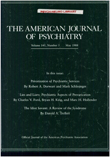The legacy of Ewald Hecker: a new translation of "Die Hebephrenie". Translated by Marie-Louise Schoelly
Abstract
Early descriptions of schizophrenia may be found in the writings of Haslam and Morel, but the turning point in the development of the modern concept was Ewald Hecker's classic paper on hebephrenia in 1871. The syndrome he described--a psychosis of early onset with a deteriorating course characterized by a "silly" affect, behavioral peculiarities, and formal thought disorder--not only adumbrated Kraepelin's generic category of dementia praecox but quite specifically defined the later subtype of hebephrenic, or disorganized, schizophrenia as well. The present translation into English of Hecker's "Die Hebephrenie" makes accessible a crucial milestone in the history of modern psychiatry.
Access content
To read the fulltext, please use one of the options below to sign in or purchase access.- Personal login
- Institutional Login
- Sign in via OpenAthens
- Register for access
-
Please login/register if you wish to pair your device and check access availability.
Not a subscriber?
PsychiatryOnline subscription options offer access to the DSM-5 library, books, journals, CME, and patient resources. This all-in-one virtual library provides psychiatrists and mental health professionals with key resources for diagnosis, treatment, research, and professional development.
Need more help? PsychiatryOnline Customer Service may be reached by emailing [email protected] or by calling 800-368-5777 (in the U.S.) or 703-907-7322 (outside the U.S.).



